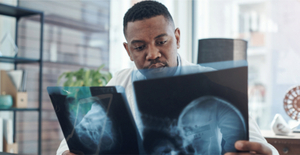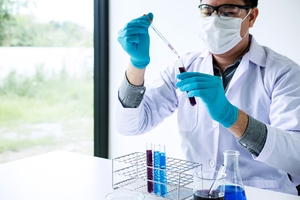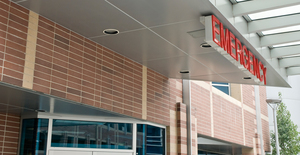COVID Antibody Testing
Your body makes antibodies in response to COVID-19 exposure, illness, or vaccination as a part of your immune system. During antibody testing, COVID-19 antibodies are identified and quantified.
What is antibody testing?
Antibody COVID-19 tests, also known as serology tests, are designed to test for a past COVID-19 infection. They are blood tests that can detect if you have historically become infected with COVID-19 based on the antibodies circulating in your bloodstream. Antibody testing will not test if you have an active COVID-19 infection, so you should utilize other testing modalities if you believe that you are actively infected with COVID-19. If you have recently received a COVID-19 vaccine, antibody testing could show artificially positive results, as you will have antibodies circulating in your bloodstream in the days or weeks following vaccination.
To better understand antibody testing, it can be helpful to understand what antibodies are. Antibodies are proteins produced by the body when you become infected with an illness. Ultimately, they are the body’s defense mechanism to aid you in your recovery efforts. The body will identify a virus as foreign and attack it, and in doing so, the body will develop antibodies. Typically, it takes about two to three weeks post-infection to have enough antibodies to show up in a blood test, so don’t test for antibodies too soon post-infection.
There are two types of antibody tests for COVID-19: binding tests and neutralizing antibody tests. Binding antibody tests are the kind that are most widely available, and these tests simply look to see how high the antibody load is within an individual. Binding tests do not tell you how protected you are against reinfection. Neutralizing antibody tests are less available; newer tests are a bit more detailed in their analyses of the types of antibodies that you have circulating in your system. The neutralizing tests look to see how strong your antibodies are at fighting against a COVID-19 infection.
Who should get an antibody test?
According to the Centers for Disease Control (CDC), you should get an antibody test if you believe that you have been exposed to COVID-19 in the past or if you are curious about if your body is still producing antibodies against the virus. Most people get the antibody test to provide them with clarity or reassurance regarding their immunity status.
Additional reasons for people to consider getting an antibody test, according to the CDC include:
- If you have experienced COVID-19-like symptoms in the past but were never formally tested, an antibody test would provide clarity that you were in fact infected with COVID-19 and not a different sickness.
- If you are undergoing a medical procedure in which you want to take an abundance of caution to ensure that risk is mitigated.
- If you have had COVID in the past and want to donate blood to help treat other people with COVID-19.
How to get a COVID antibody test
Most antibody tests can be obtained through your local healthcare provider. Because they are not actively being recommended as a diagnostic procedure or to assess immunity by the CDC or by the Food and Drug Administration (FDA), it is often left up to an individual to contact their healthcare provider to undergo this testing. In addition, most labs will run an antibody test, so contacting a local, certified lab is another effective way to get these tests completed.
What to expect during an antibody test
If you haven’t undergone the experience of getting an antibody test, it can be helpful to know what you are going into ahead of time so that you can be best prepared. First, there are no steps needed or considerations to be made prior to going in for a test.
During the test, a healthcare provider will take a blood sample, usually by a finger prick or by taking blood from a vein in the arm. The blood sample is then sent to a lab to be analyzed for antibodies present in the blood.
After the test, you should not notice any side effects and you should not have any limitations. Usually, you receive results within 1-3 days. However, this can vary based on the testing site.
What to do if you test positive for COVID antibodies
If you test positive for antibodies, this simply means that you have circulating COVID-19 antibodies in your blood, notes the CDC. This means that you have had a past infection, whether you had symptoms during that infection or not. If you test positive for antibodies, it is currently recommended to assume that you are not completely safe or immune from reinfection, reports the CDC. Additionally, the CDC recommends that you continue to take necessary precautions, even if testing positive for antibodies, as there have been cases reported of reinfection. Also, as mentioned above, the CDC notes that you may test positive for antibodies if you get this test completed too close to when you had the vaccine.
If you test negative for antibodies, this simply means that you do not have circulating COVID-19 antibodies in your blood, reports the CDC. Of note, the CDC states that it is unknown if all people who become infected with COVID-19 will produce antibodies in an amount that would be detectable in these tests. Additionally, if someone were to develop antibodies after being infected with COVID-19, depending on the time in which they get an antibody test completed, their levels of antibodies may be too low for detection, even if they have some circulating in their bloodstream, notes the CDC. For example, if antibodies last, on average, three months, and someone were to go to have an antibody test completed close to this three-month mark, the test may show that they do not have any circulating antibodies, when in reality, that may not be true.
Find COVID Antibody Testing near you
- Alabama
- Alaska
- Arizona
- Arkansas
- California
- Colorado
- Connecticut
- Delaware
- Florida
- Georgia
- Hawaii
- Idaho
- Illinois
- Indiana
- Iowa
- Kansas
- Kentucky
- Louisiana
- Maine
- Maryland
- Massachusetts
- Michigan
- Minnesota
- Mississippi
- Missouri
- Montana
- Nebraska
- Nevada
- New Hampshire
- New Jersey
- New Mexico
- New York
- North Carolina
- North Dakota
- Ohio
- Oklahoma
- Oregon
- Pennsylvania
- Rhode Island
- South Carolina
- South Dakota
- Tennessee
- Texas
- Utah
- Vermont
- Virginia
- Washington
- Washington DC
- West Virginia
- Wisconsin
- Wyoming
COVID Antibody Testing FAQs
How long do COVID antibodies circulate in your system?
According to the CDC, COVID-19 antibodies may be detected for several months post-infection; however, the amount of time they circulate will vary with each individual. On average, the CDC estimates that people have circulating antibodies for around three months.
If I have COVID antibodies, am I protected from COVID and/or do I need to get another vaccine?
The CDC reports that there is currently not enough evidence to provide concrete guidance on how long you may be protected with antibodies against reinfection. Always take individual precautions if you are within a high-risk population. If you have questions regarding booster shots, it is best to contact your local healthcare provider.
How accurate are antibody tests?
While accuracy will vary, an antibody test could lead to a false-positive and/or false-negative result, notes the CDC. Because some manufacturers of this test expedited the process of making these tests accessible, many have gotten false-positive and/or false-negative results.
Are antibody tests used to diagnose COVID-19?
No, antibody tests cannot be used to diagnose COVID-19. If you are wanting to know if you have an active infection, it is best to use a diagnostic test, recommends the CDC.
What if I get different results from two antibody tests?
Antibody tests could provide an individual with differing results if the design of the test is variable, based on how the tests are performed and based on when a test was taken.
How much does an antibody test cost?
The cost of antibody tests often depends on the process and where they are taken. Some laboratories allow for the cost to be billed directly to your health insurance. If your insurance does not cover the cost of the test, the test can cost anywhere from $35-100 out of pocket, according to the Mayo Clinic.
If I test positive for antibodies, can I infect other people?
Yes, the CDC warns that even if you test positive for COVID-19 antibodies, there is still a risk of transmission of the virus to others. The antibody tests do not indicate whether you can infect other people.
Can I use an antibody test to determine if I should go back to work or school?
No, antibody tests should not be used as a measure for if someone is safe to return to a work or a school environment, notes the CDC. Antibody testing should also not be used as an exemption test for testing for active COVID-19 infection.
Solv has strict sourcing guidelines and relies on peer-reviewed studies, academic research institutions, and medical associations. We avoid using tertiary references.
Everyday Healthcare, Simplified
Expert advice to help you live your best life

 LinkedIn
LinkedIn





